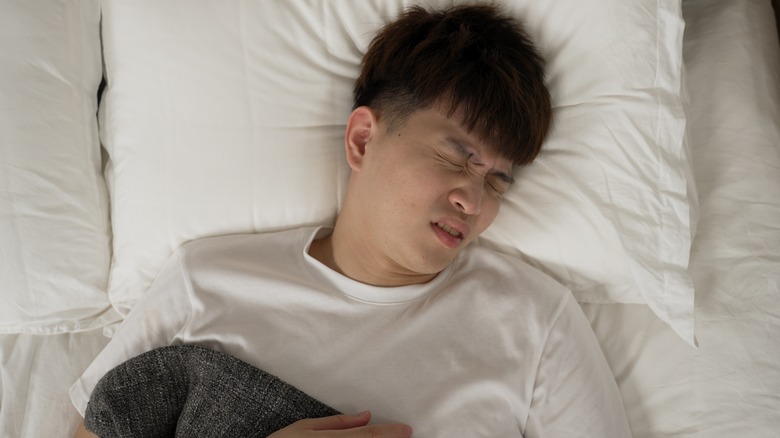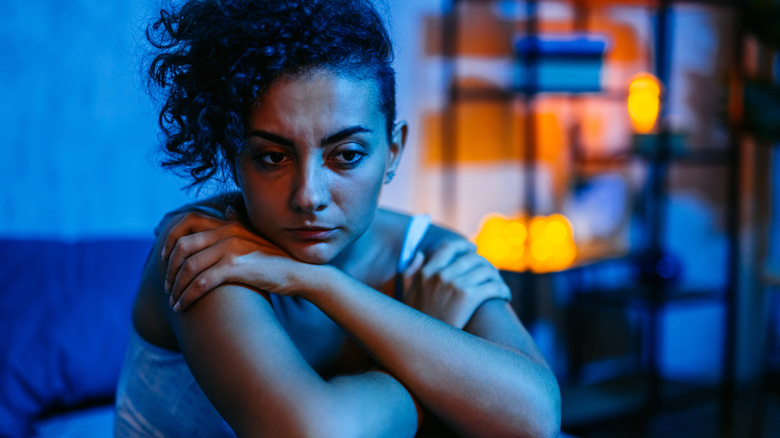What It Means If You Die In Your Dreams
In our dreams, we sometimes come face to face with our worst nightmares — including death. Falling from a cliff, drowning in open water, or being chased by a wild animal through the woods are all terrifying scenarios that can lurch us awake in the middle of the night in a cold sweat.
Some people approach death dreams with a sense of foreboding. Yet science tells us that dying in your own dream shouldn't be taken as a sign of things to come. Rather, these kinds of dreams often occur in individuals who are approaching a turning point in their lives, licensed clinical counselor Jeffrey Sumber told HuffPost. Such turning points might include a breakup, moving away, or leaving behind a school or job. In essence, it's the end of one chapter and the beginning of another. If a person is feeling apprehension around these life changes, the fear of things coming to a close can sometimes play out in our subconscious as we dream.
Dying in your dreams might mean you have death anxiety
Dying in your dreams doesn't always mean you're in the throes of a life transition, however. For some people, it can alternatively indicate anxiety around death itself — referred to medically as "thanatophobia," explains the Cleveland Clinic. "The majority of human beings are relatively unsure about their own death," Sumber told HuffPost. "[Many people] wonder when it will happen, if it will hurt, and what will occur afterward. Thus, our psyche is constantly working these dilemmas out through our waking as well as subconscious experiences." Therefore, if you're someone who experiences a great deal of worry around death, dying in your dreams may be your mind's way of attempting to process this fear. However, if you find anxiety is impacting your day-to-day life, consider reaching out to a mental health professional for support.
Sumber also points out that we often do not get to the end of death dreams. Rather, we tend to wake up in the moments just before it happens. This is thought to occur because our brain does not have any reference material for what comes next after we've slipped off that cliff or after that wild animal has caught up with us. Essentially, because our brains have no prior experience with what comes after death, our brain doesn't know how to proceed with the dream and so it instead comes to an end.
Scary death dreams vs. peaceful death dreams
Exactly how and why we dream is still debated among the scientific community. Some experts believe it's simply the result of neurotransmitters firing as we snooze (per Psychology Today). Oppositely, professional dream analyst Lauri Quinn Loewenberg told The Cut that different types of death dreams may hold different meanings. For example, a violent death dream may signify that you're resisting a change in your life. More specifically, a dream that involves you being killed by a loved one might mean that a person in your life is pushing you to make a change. Being killed by a stranger, on the other hand, tends to be more representative of how we're feeling towards ourselves and if we are putting pressure on ourselves to make a change.
Not all death dreams are scary, however. This was demonstrated in an early 1989 study published in OMEGA – Journal of Death and Dying in which researchers found that although dying in one's dreams was a relatively rare occurrence among healthy adults, the majority of these dreams were pleasant in nature. In fact, over 50% of dying dreams examined in the study included extensive depictions of an afterlife. Loewenberg reassures us that dying peacefully in our dreams often means that we are comfortable with the life changes we're experiencing rather than fearing them.



